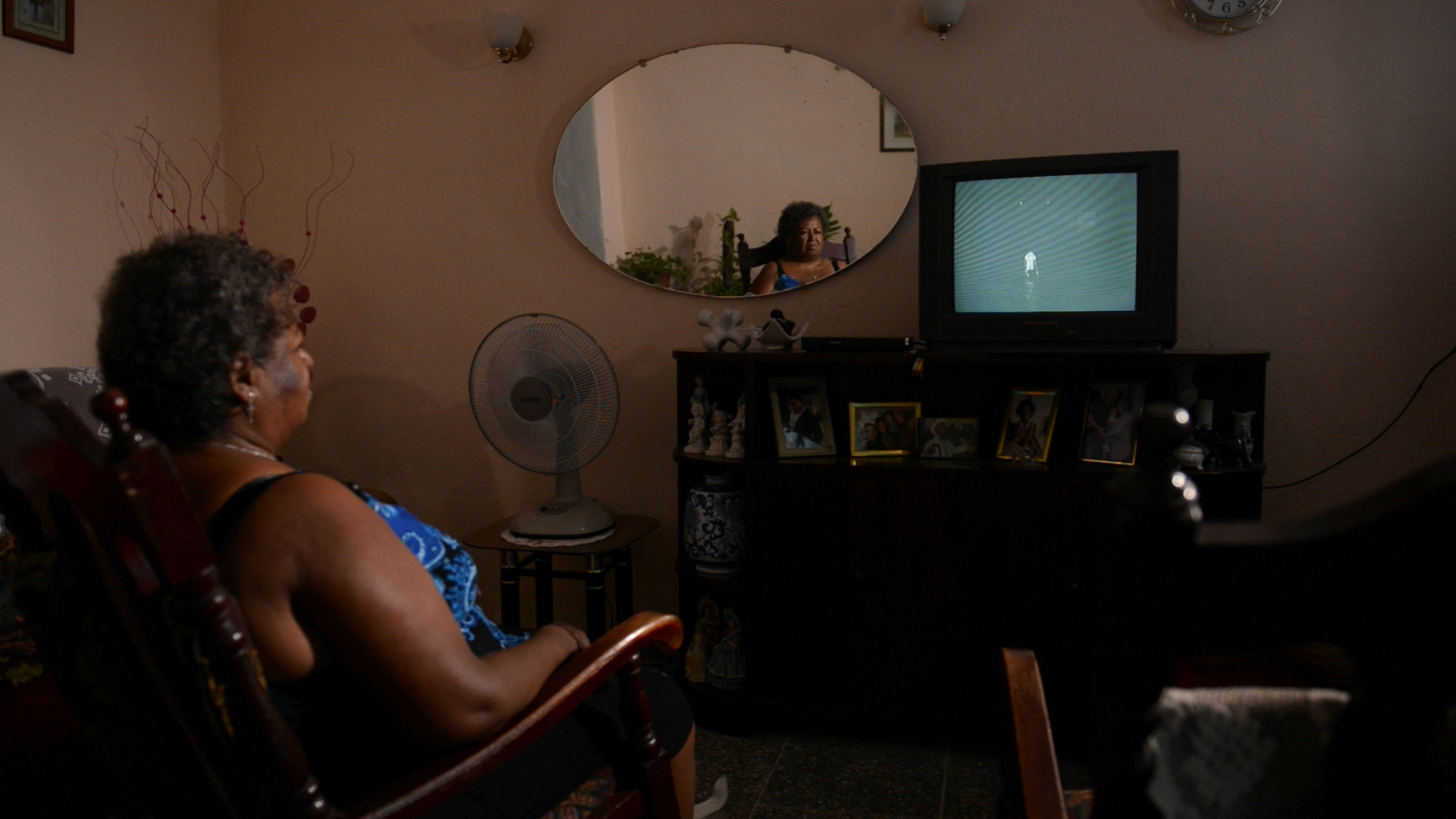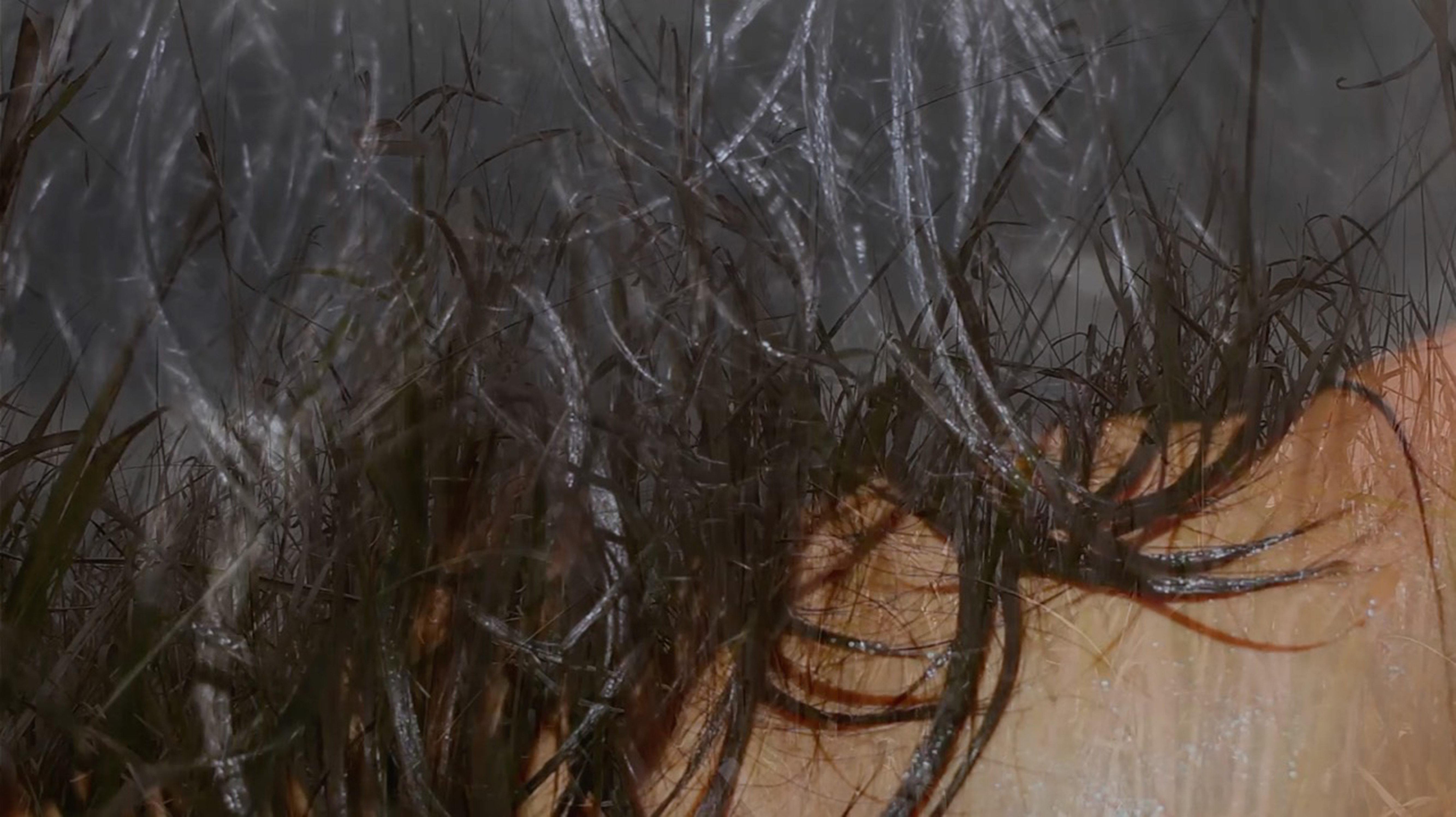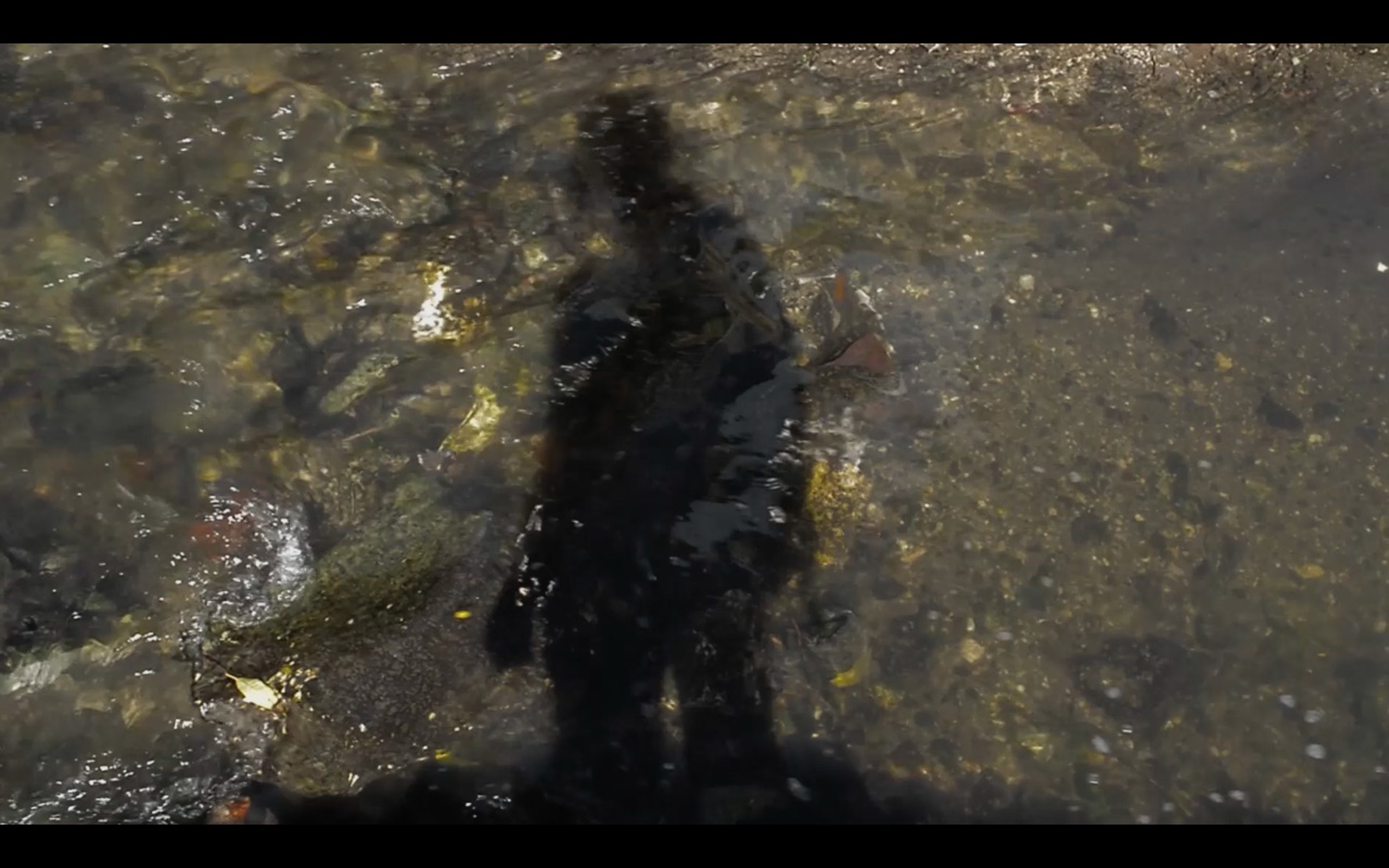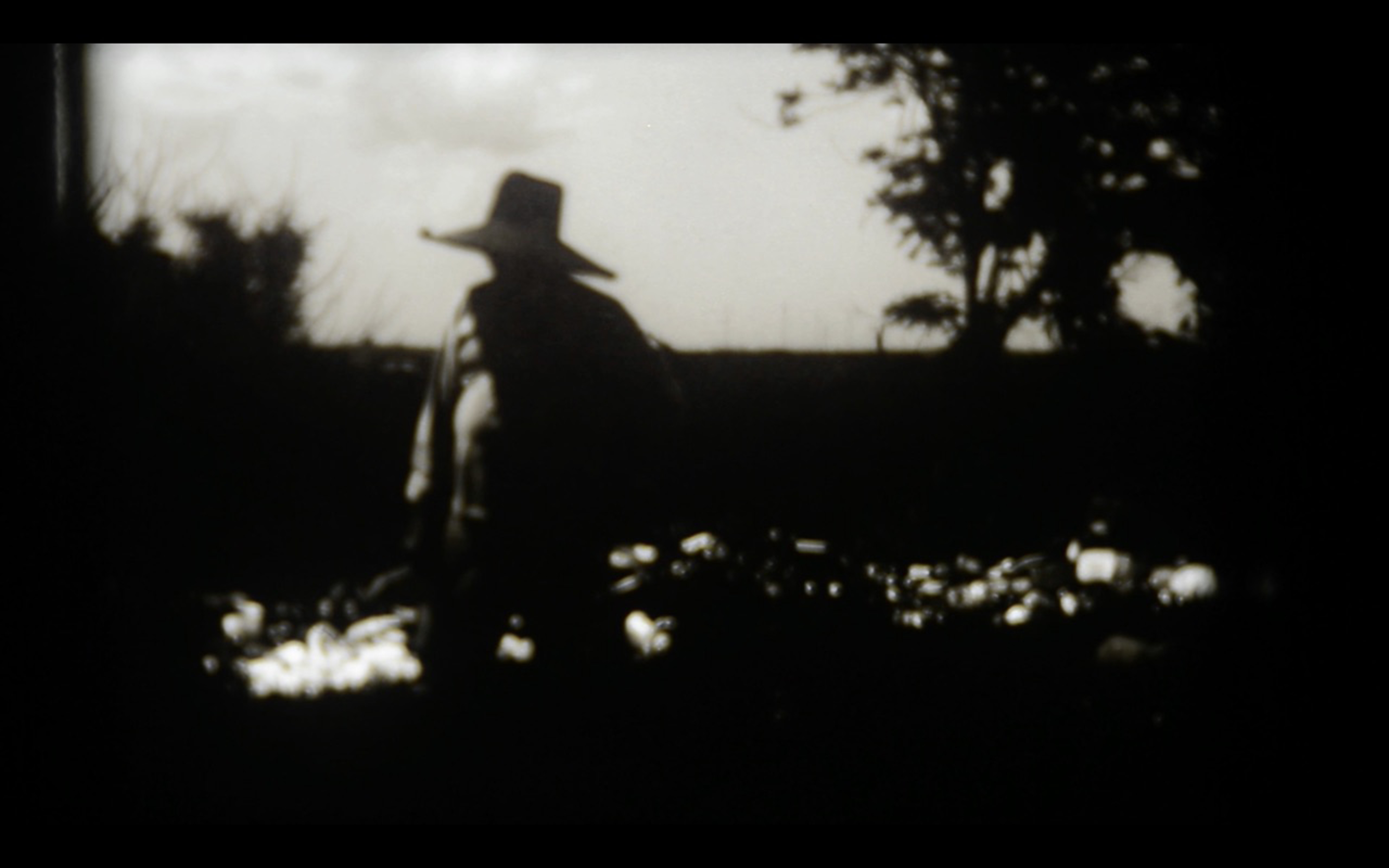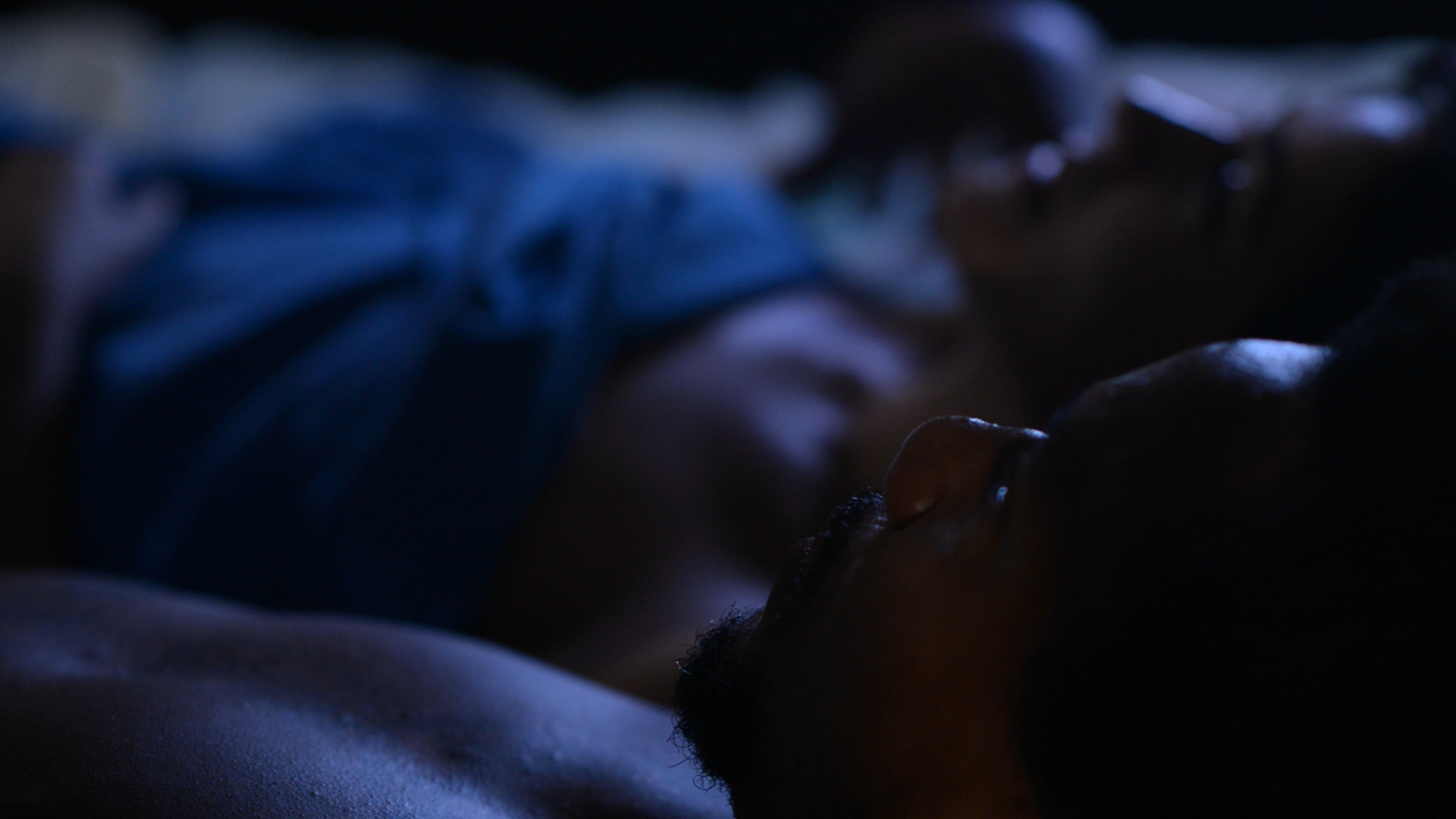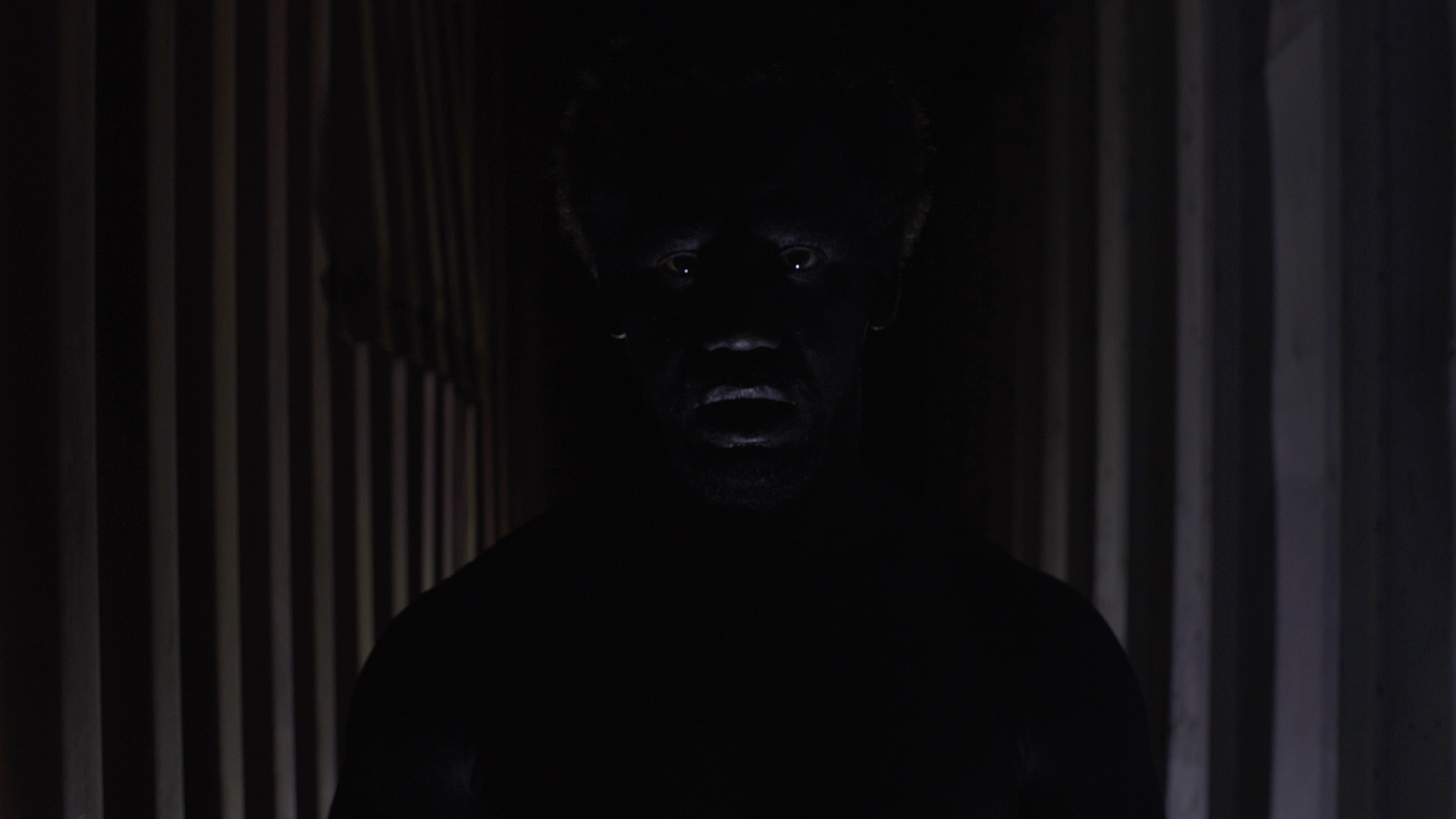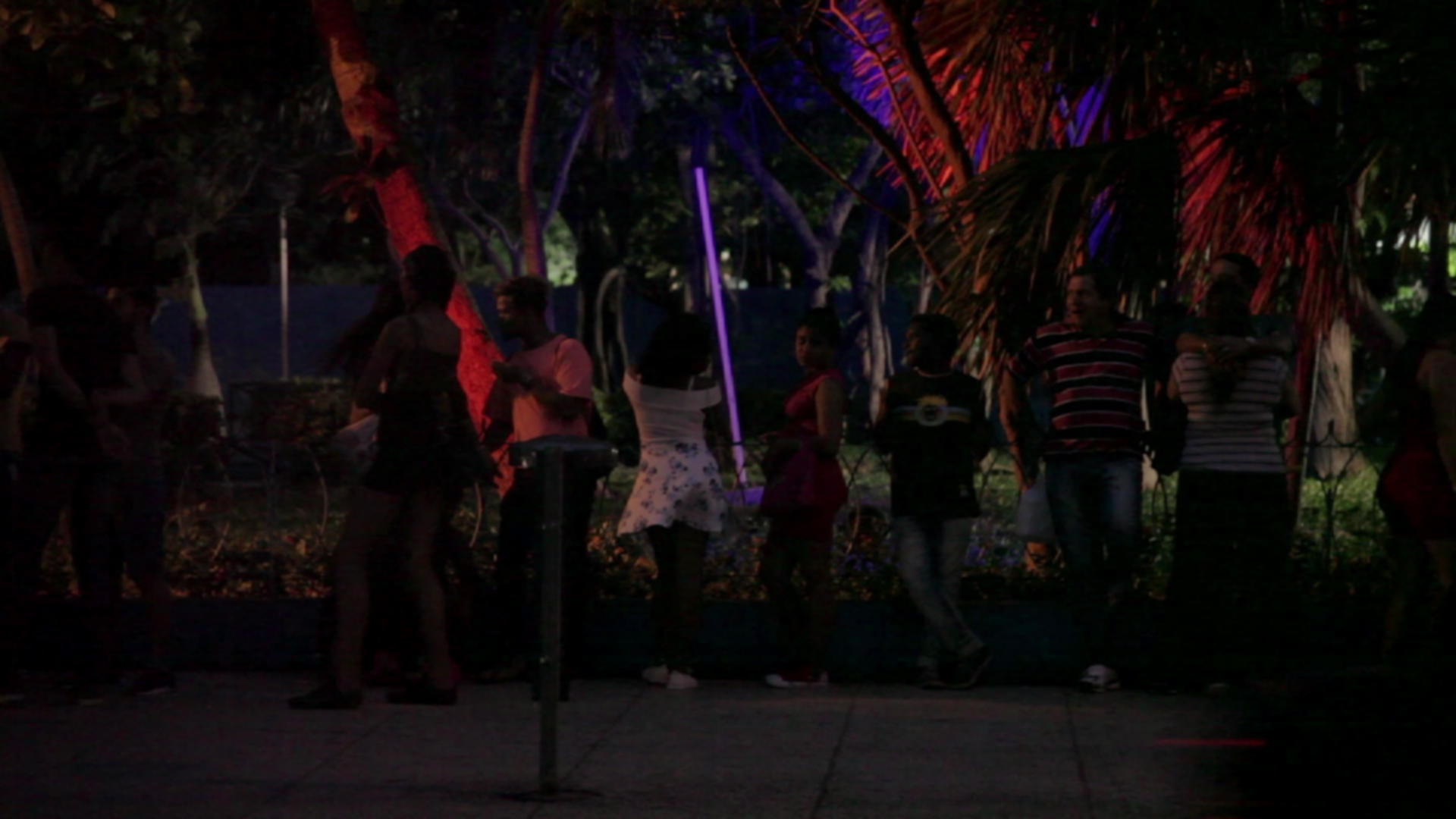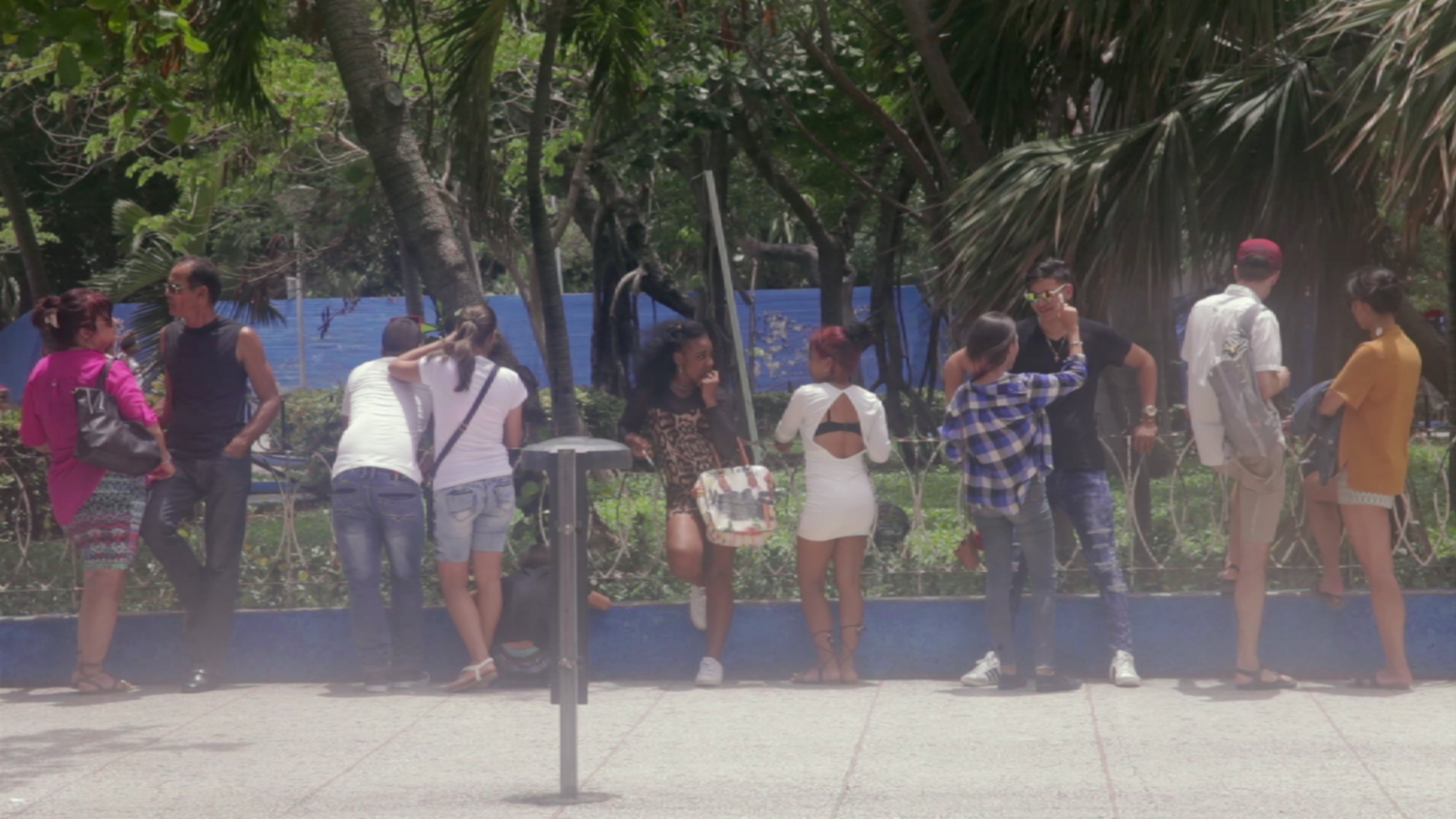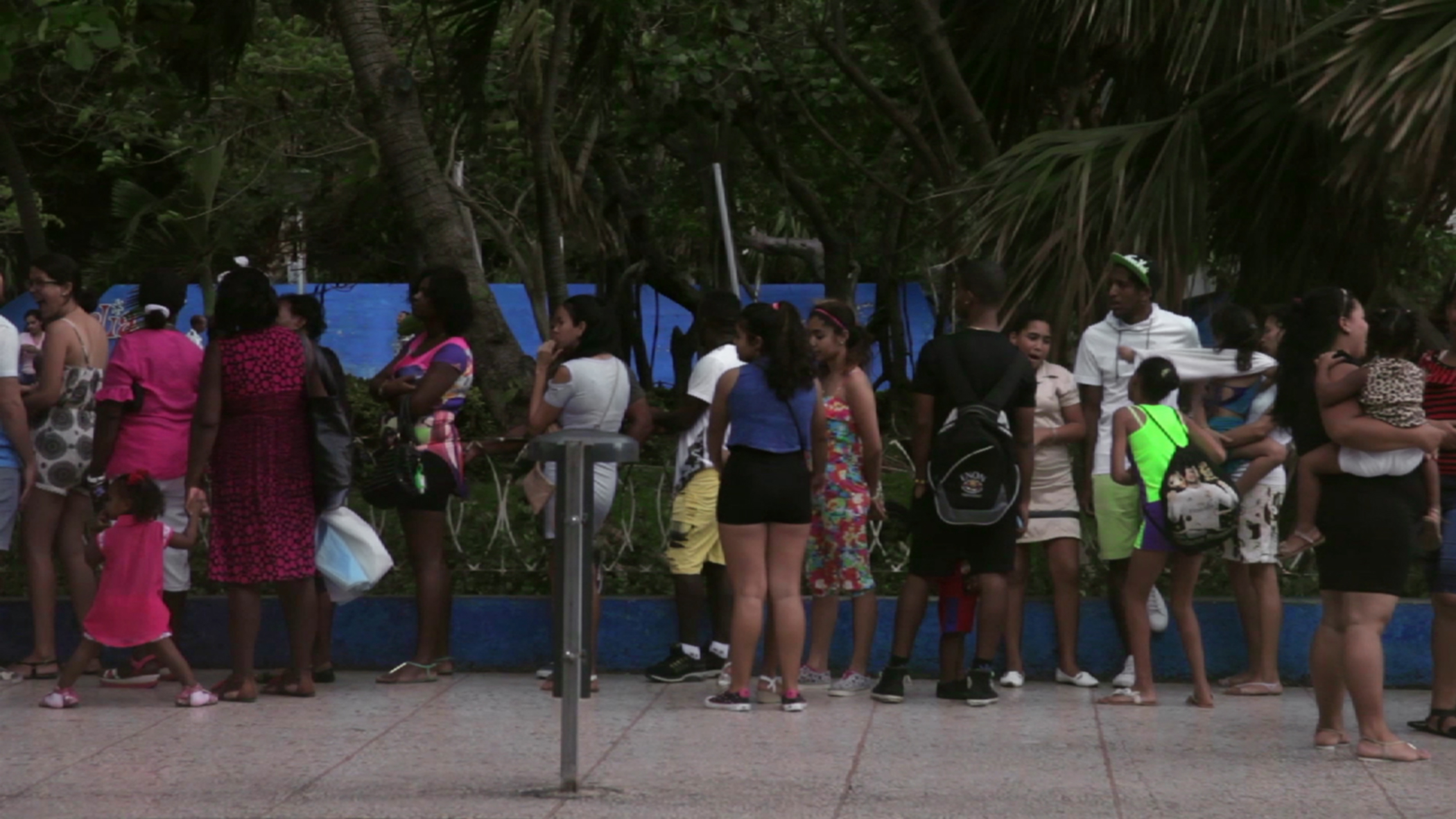News from the South
Sat., April 27, 2019
7:30 pm | Doors 7:00 pm
Arcadia Housing Co-Op, 680 Queens Quay W, Toronto, ON
$10 general admission
$5 member/student
or by donation
(no one turned away for lack of funds)
Part of Winter 2019
NextGen South American artists reinvent the diary form using digital poetries to conjure new fragilities and alliances. The state is also a body, and these interfaces, too often cruel or else filled with a pleasure that can hardly be contained—all this is explored via digital mirrors and memorials to past selves.
Pleasure Dome is pleased to host two screenings. The first will feature the work of three women: Adriana Garibay from Mexico, Veronica Abarca from Chile and Juliana Lobo from Brazil. Adriana and Veronica offer troubling double takes on the diary genre, while Juliana looks deeply into the line-up at Cuba’s famous ice cream stand using a single frame in an updated structuralism.
The second will offer the work of Colombian maestro Camilo Constain: The Engineer. His peerless technical prowess and painstaking working methods ensure that every frame is a dream come true. This is his first North American retrospective and will feature a bold post-narrative, a dance movie, a cross-dressing opera in one take, and several diary potions.
Interviews:
Metaphors of Democracy: an email chitchat with Camilo Constain and Mike Hoolboom (2019)
Metamorphosis: an interview with Adriana López Garibay (March 2019)
Waiting for ice cream: an interview with Juliana Lobo (2019)
Camilo Constain
Metaphors of Democracy: an email chitchat with Camilo Constain and Mike Hoolboom (2019)
We met at the International Film School in Cuba where Camilo was doing a master’s degree in “alternative cinema” (believe it or not). Every shot he made took an hour to set up. He was meticulous and open-hearted, the class cook, a late-night hauntology. He was conjuring a personal cinema of precise frames, with the chiaroscuro lighting he’d learned as an oil painter, now turned to inner explorations that jogged easily between the personal and political, as if there was no way to draw a line between the two.
Camilo: Sorry, I’ve been busy! I always like to take my time and my full body when I write, so I can communicate more precisely. Sometimes we are in a hurry and don’t feel the words we tell.
I have been working on a project. A director friend invited me to participate in a play he wrote with a colleague about memory and how post-colonialism has affected so much of our land. It’s about a young girl making a documentary on a family whose father was killed for not selling his land to corporations. I helped make videos and also designed the language of the space when she uses a camera onstage. The first show was today so I finally gained some energy to write!
A friend in Bogota invited me to show my work at an event she organized. It was well received and people asked questions. We had a very nice chat about independent cinema. I felt good.
I have also been giving painting classes to unemployed adults who are being subsidized by the government. In return for wages, they get educated, with extra workshops in painting and photography. It’s an amazing group with humble and beautiful people. There is a 50-year-old guy in fifth grade and it takes him 40 seconds to draw a triangle. He talks and draws like a 6-year-old but his eyes are so brilliant and transparent. When I see him I only want to cry and hug him. On his shoulder, he has a bag where he carries his urine because his bladder is injured. But he still comes to classes and walks outside in the street with his bladder in a backpack. These people open my heart. I think teaching is the most beautiful learning experience.
I’m trying to know if I’m in love or not, that’s funny huh? I’ve been with someone for more than a year, and I don’t really know what’s going on in me. I always tell myself that she is not the one, but at the same time, I know that if she leaves me I’ll go crazy! So what’s love? Interesting question. We always want what we don’t have. Is that a fucking law? Or should we break that shit!? I live a pattern in love. I don’t accept the one who loves me. It started with the mother of my child. The moment I lose them, I love them. That’s crazy huh?
Mike: Still hard for me to imagine being with someone, to break the eternal bachelorhood that offers an endless horizon of work. I think I’m hearing that you’re in a relationship but not yet in love. I know this feeling, though it’s not my own exactly. But I’ve met someone recently who tells me that exactly this happens over and over again. In fact, the pattern requires her to be with people who can’t see her and grants her the unwanted superpower of invisibility, which inevitably causes her to break things off. I had to ask: are you always the one who ends the relationship? Yes, every time without exception. And at the moment she announces the end they fall in love with her.
The work you describe on the play feels like an old dream where I might be part of something larger. Instead, it’s one movie after another, which is also fine, but to work alongside and in collaboration, that would be a something. One day perhaps we might even try to make more than words together. Can imagine your sociable self saying yes to that?
Camilo: I finished teaching the painting classes and then the people who hired me made an exhibition of “the best works.” Thankfully they chose the pictures not me, and that’s when I realized that the phenomena of a jury is a very strange thing. They chose seven paintings that were completely different from what I would have picked, this must also happen with festivals and movies, the best ones are never chosen because the best will be different for everyone. How interesting must be the negative space of a festival or even a single film? The movies that by chance were not selected and therefore unseen. Does a movie exist if it’s not seen? I thought of all the other negative spaces. The movies never made because of the fear of not being liked.
I was invited into a group art exhibition in an alternative circuit. In a house of 17 rooms, each artist had to represent an emotion. I’m always thinking about politics recently and made a very fancy dinner. I rented tables and dishes but instead of food I put on the table my own urine, my cat’s poop, a very intense glue that homeless people use to drug themselves and water from the Bogota river, one of the most contaminated rivers in the country. I wanted to create a high contrast image wherein the beginning everything looks perfect but in the end, everything is rotten and poisonous, a little metaphor of our democracy in Colombia.
Here is an image. But the thing I wanted to explore here was the smell. The room smelled like hell.
Mike: The mysteries of modern art. It must be good to live in the twin peaks of galleries and movies, though usually, I find art mystifying, it rarely touches my heart. “Projects” by contemporaries are supposed to be full of brave new ideas and conceptualisms, but I find more thought balloons in novels.
Camilo: Your sensibility amuses me. These pieces are not for the heart indeed. They come from the tired brain but I had to make these statements. Did you see the Democracy video?
Mike: Democracy video? After speaking to a brace of serious doc programmers in Russia I realized how little I have seen over the years, the smallness of the world I inhabit. They watch thousands of movies each year. I would melt under that load, or at least turn into a cynical tasteless monster, as of course so many have. On the return flight, it was only: Avengers, Tomb Raider, Commuter — Hollywood movies that push bodies through terrible trials before instantly rebounding. Why is it so satisfying to put my body into this frozen, bullet-ridden, bruised and shattered avatars?
Have been crunching on the new movie and on Friday there was a party where my collaborator brought it along only to find everyone hating on it. Hahaha. It’s unfortunate how much she suffered amongst the loose-tongued negativities, which as usual I was more than encouraging. As the only sober moment in the room, I urged them on, determined to wring out every wine-addled comment. It’s still a work-in-progress and am sure it will be fine after a bit of tuning up. Speaking of slings and arrows, let me know how your exhibition goes. Democracy video?
Camilo: My exhibition was good! The opening was plagued with rain, but by the end, a lot of people visited and I received fine results and comments. Good news! I sold a video! It’s called Democracy (6:24 minutes 2018). In the left channel, we hear the speech of the left-wing candidate, and in the right channel, we hear the right-wing candidate (who won again). I sold it! So I already have the money for the ticket to Toronto next year!
https://vimeo.com/292581305
password: democracia
I’m also sending you pictures of the two other pieces I made. One shows the world on an art pedestal. It has a bill reader and a coin reader. Depending on how much money you put inside, it makes the world move. It’s my favorite piece, fresh and funny, people love it.
The second is the Colombian flag of peace. I think the image tells more than I can say. This week I am going to make proper pictures and videos of the pieces. I’ll send you a couple with the phone.
After that, there was Bogoshorts, the Bogota short film festival. From December 4-11 there were screenings every day, a marathon of short films. We had to make a single shot, one-minute movie on any subject. So we gathered a couple of friends and made three little one-minute films on the weekend. Two were directed by friends and I did the third. I made the camera on all three. I love to have the camera in my hands.
It was very fun. A very talented Spanish girl I met in Cuba came to the festival with a short film. I declared my love to her hahahaha in a letter after she left, she must have read it on the plane, and I really don’t know her answer. I think she got a little scared, jajaja, honesty makes people scared. I was very gentle and poetic. For three days I received her in my home and then we traveled to a little house my grandma has in the country! Everything was very clean and real. I never showed myself to be needy or in love. I behaved as a friend. She told me she was in trouble in her relationship in Spain and I felt she liked me. I didn’t know how I felt, that’s why I wrote her a romantic letter. To make the short short: I felt elegantly rejected.
I have been receiving negative responses from festivals. I’m not going to the Berlinale, Rotterdam or Clermont. I guess it’s not easy to see 6000 films and choose. This is my first time applying to big festivals and now it’s nice to stop caring, to stop believing in it so much. I am working on my need to be liked and accepted in the cinema world. I don’t want to be controlled by that emotion.
Tomorrow I will leave the city and go to the sea with my family. My daughter is catching up with me on the 26th. I will be on the quiet beach for two weeks hanging out with my sister’s daughters, my parents, and my daughter. I will read and write and sleep, nothing more. I will have internet, however, anything you want to write please! There has been already six months since we met! Thank you again for these opportunities. I would love to talk to you about a lot of things, one of them is that we should do a movie together! Someday in this life!
Mike: The negative space, the unselected, yes. I remember going to the mighty Oberhausen festival many years ago. Then, as now, it remains a showcase of dismal efforts and unfortunate choices, with a few masterpieces sprinkled in. But the video library of submissions, crammed with the hundreds (now thousands) of titles they didn’t pick, remains a revelation. I first encountered the work of Sadie Benning there, an iconic low fi diary visionary. Later the fest put on a retrospective and she was invited to be a juror, but back then she was only a rumour. They turned down all of her work, even though it was better than everything in the program. I’ll never understand selection. Many of the most tasteless people in cinema wind up having these jobs and holding onto them for years.
I was thinking re: our film together. That I shrink from the prospect of admitting that I am a filmmaker or that I’m “really” making a movie, or even shooting a movie. It all happens by accident, as an aside, while I’m pretending to do something else. I realize this hardly makes sense, coming from someone who has made six features in the last four years. But you, on the other hand, seem to have very specific pictures in mind, very particular moments that you want to share. And these formations begin as images, and only later do the spicy broths of words and sounds enter the frame. Is that true? I ask because I was wondering how we might work together if you are intent on doing the thing itself, while I am so busy pretending I’m not doing what I’m doing. But perhaps these are two ways of saying the same thing.
Camilo: I come from oil painting which means I start from an image in my head, but that image is an impulse only, and the act of painting or for that matter cooking or dancing, corresponds to the way you describe your modus operandi. It simply happens. When we dance or cook we never plan, one step follows the next.
What you say about my way of doing films could be a nice compliment to your automatic or interiorized or never-ending method. My intentions to control the image might be a good ingredient. We both love portraits. Did you see The Mirror of Tarkovsky? Did you like it? It blends archive, fiction, and documentary, a powerful cocktail. I don’t want to sound pretentious. One afternoon we talked about images that come from our interior, and how by being in touch with them and projecting them, we can heal things in our subconscious. Do you remember that conversation?
We are going in the same direction via different boats. But that doesn’t mean that we cannot make a bigger boat with the best qualities of each. Just for a part of the river, I wouldn’t find it crazy if we put a motor into a kayak for part of the journey. Your class broke a lot of walls in my brain. My trip to Toronto could be more productive than I think.
Or are your doubts coming because you think there could be friction?
Some months ago I thought about proposing to you a group of audiovisual letters. You send and I respond. This form has been used by a lot of filmmakers, they’re called “correspondences.” I saw one from Jonas Mekas and the Spanish filmmaker Jose Luis Guerin. That was my first idea and then I thought we could find our own formula.
Mike: Yes, let’s make a movie together. But you know me, I like to begin in the middle or at least to get started instantly. Last night Alena and I made a shot that is heaven itself. Have enclosed a link for our movie so far, though it is only fragments and bits. It is filled with conjectures, possibilities, maps without directions, geographies without roads.
Wondering what you made of our small footages, did they seem unbearably slow, or simply: unbearable? It’s aimless beauty I realize. What does it contribute to the conversation? What does it have to say?
Camilo: Of course they are not unbearable or boring. I like what you have! As always the sound is going in an excellent direction. Maybe some shots could be a little shorter and it wouldn’t change the meaning, the doubt instilled by this slow city you’re proposing.
Mike: Do people really not respond to emails during vacation? In North America, we have banned vacations, time off, off hours, weekends, relaxations of any kind. Asocial media responses should come ideally before the message is sent.
Camilo: You made me laugh about the vacation question. Everyone needs to disconnect a little bit from this monster! Not checking email for a few days is important for myself and I think the rest of the world.
These days have been tough, my dad has cancer in his brain, and he was a couple of days in the hospital. Health. Is there anything more important in the end?
A separate question: what are your metaphysical beliefs? Do you find possible all the things we cannot explain with our brains? Or do you move in a more realistic and skeptical way in understanding our existence? I’m sorry you may laugh, I’m reading a book about how spiritual life and science should be on the same track. Do you believe in extra-terrestrial existence?
What do I believe?
I believe in vibrations, the spectrum of vibrations is divided into what we call dimensions. Humanity is a small part of an infinite universe. Human religion is very small and not enough to explain this. It’s a matter of controlling weak spirits I guess. Not exactly weak, that’s not the word. Humans disconnected from their spirit.
Mike: I believe in everything more or less. Though my Russian comrade openly scoffs whenever the phrase “my astrologer” escapes my mouth. Village superstitions, blood rites, and hazy metaphysics. But there remain experiences that can’t be explained, why we might meet someone for instance, and the unexplained feels more important than the small corners of the world that my adding machine mind can entertain. I’m leaving god out of this, of course, no need to turn patriarchy into an eternal projection.
Can you talk about your newest dramatic outing Para El Ojo Parece or For The Eye (13.5 minutes 2019)? It was thoroughly mysterious, until the meta-narrative disclosures at the end.
Camilo: “Para el ojo parece” is a Spanish phrase meaning that what we see is only an appearance. The title of the film responds to the first question I asked myself: what is real in cinema? There are different ways of naming a film: documentary and fiction, for instance, but I started to question how we approximate reality in both fiction and documentary.
I wanted to work with an actor, someone completely familiar with the camera, as the main character in a documentary. I wanted to erase the line between acting and not-acting. I am very interested in how real life is also acting, therefore documentary is also fiction.
I started shooting with my actor without any script and in the first days he felt very strange (telling an actor not to act is very interesting). For three months we shot on weekends — his daily routines and passions, his family, his pet, etc. When I had five or six hours of footage I started organizing it and showed it to teachers who said the idea of the movie was fine but the footage didn’t show it, and that the images weren’t “me” (they were shot by a friend of mine who is a DOP).
I cried for a complete day and felt I had lost three months of my life. I gave a lot of importance to an honest teacher’s opinion, some mixture of intuition and reason made me believe it. I don’t know what the film would be if I continued with it, that’s still pending, but they made me shift dramatically and now I’m very happy with the result.
I started to think about the 15 hours already shot as research, preliminary notes. I had another four hours of archive material of all the movies my actor appeared in, so I wrote a five-page script about what I had seen in his life. I selected the moments of inactivity, where he is not working, and therefore is more him. So the paradox was still present: the actor that acts he is him. I played with representation by adding layers of screens inside the frames of the movie and we don’t exactly know that he is an actor. The result is a portrait of his confusion, his interior thoughts, his fears.
Mike: I remember seeing you the day you spoke to Rafa and Iglesias about the first version you had worked so hard on. How open-hearted you were, your face streaming with tears, it was so touching. I thought: here is a real filmmaker, a real artist. It was an honour to be with you when you were so open and broken like that.
While you were bunking at the famous International Film School in Cuba, you made a number of stellar things, including, most improbably, a dance movie. Can you tell me about it?
Camilo: Ylojyko (minutes 2018) is about breaking logic. The Spanish title stands for “not logic” and has all the letters inverted. So in the first place, I want to question the logic of interpretation. Our bodies have a logic. We always walk on our feet, clouds are in the sky, fish are alive in the sea, we go into the shower without clothes… the old patterns are the best place to start.
In this movie, I wanted to explore the movements of our bodies and question its logical positions and movement progressions. We advance from point A to point B. But what happens if we don’t really know what is forward or reverse? In some moments the sound is completely synced, and sometimes not. That’s another way to break the movie’s logic.
The second idea concerns the frame. I wanted to make a fixed shot with the three represented dimensions the shot gives me: x, y and z-axis, and all without touching the camera. I wanted to create a shot whose elements were constantly changing to create a live composition. This is what we learned during the two-week workshop about video dance. How the body is an element of composition and how architecture determines the flow of the body. The sound was made live using only materials found on location.
Mike: It’s a strangely beautiful creature, it forms a chiasmus, an X, which was for so long a kind of grail of avant-garde movies – to create a film that could run backwards and forwards. Each mover makes an entrance and has a characteristic gesture or way of moving, and these slowly accumulate and overlap. I can feel the time you have all been living together as your student comrades look unafraid to share their personalities, their living selves, with you and your camera. And then the whole thing backs up and reverses, and we watch everyone patiently undo what they so earnestly threw themselves into, leaving the space emptied in the end, charged with the ghosts who have come before.
Worked all day yesterday on your “interview” which is now a kind of mixmaster collage of our emails. It includes horrifyingly personal details that you will want to delete, but I thought I would include it all in hopes that some of it might survive. In texts, like movies, the most interesting, the most personal, the most terrifying, is so often excluded.
Just pulled into Rotterdam after two flights, a train, and a long layover. Ran a repeat murder loop on the guy sitting beside me, who was busy manspreading in that “unconscious” way so many men have (what? I’m touching you? As if they’ve lost all feeling in their body). I shouted at him, but not before a thousand fantasies had unreeled. Interesting to feel so close to this rage, these murderous impulses. It’s been so long since I had access to this. For years I blocked the unwanted feelings and it made me feel reliably dead. How to hold the electricity without throwing someone out of the plane window?
Camilo: My Latin American way of answering emails… for me writing these emails requires that I be seated at a computer without distractions. I also turned 32 two days ago. I had a very nice family day, so, I’m sorry if my answers are slow. I dreamt about you getting angry! It’s quite a coincidence you are telling me this. Today is one of the days I don’t understand what to believe. What the hell is a dream? What is real? Sometimes I like to believe that information is the same as fiction.
Everything in nature is violent. The explosions in the sun, the rivers of blood running inside small purple tubes. Violence often expresses a lack of justice. I am violent when I feel I’m being violated. I think that that’s why we are alive, to understand all the forces that make us. I am smoking green here, 11:09 pm. Long fucking day, these are the words my brain selects.
I want to see what you’ve made out of the interview! I’m curious! I don’t think I want to erase anything, in the end, honesty needs to be reevaluated. The culture in which I grew up obliged me to lie and hide emotions, and on the other side, who is going to read this? Most people don’t read long shit.
Adriana López Garibay
Metamorphosis: an interview with Adriana López Garibay (March 2019)
We met at the International Film School in Cuba where Adriana was doing a master’s degree in “alternative cinema” (believe it or not). Whenever I showed the upsetting movies I love too much she would cry, she seemed an open-hearted vat of feeling and intelligence. She had traveled from Mexico to spend half a year in a rigorous self-examination and continued to pick away at a post-diary collage work that might include everything that crossed her path. She was a stark reminder that pictures can touchback and that there were stakes in their production, even in this moment of too-muchness.
Adriana: Today I spoke with an old friend for eight hours updating our lives. I didn’t feel the time as we spoke about the many things of being a woman. About International Woman’s Day: I’ve never been in a march. I’m afraid. It is hard being a woman, but beautiful, not in the romantic idea that we can “give life,” but in the power we have as individuals.
I will never forget my first day in Havana, it was awful. I couldn’t sleep and had nightmares.
I am a very idealistic person so I hoped to have a very different experience walking through the city, but I just saw many sad realities and became disappointed. I felt Cuba was on the way to corruption like Mexico. I wanted to film a comparison between the countries but after talking with a friend I realized that it would be a mistake, I’m not well enough informed, even about Mexico.
I decided to get to know Cuba through Suramy, a Cuban girl. We spent many days together, with her family, my friends, hanging out in Havana and small towns, sharing thoughts and letters. She reminded me of myself when I was her age (26).
She’s a nurse at the hospital of San Antonio. She lives with her aunt who looks after her two children alone because her husband had a problem at work and can’t live with them until it’s resolved. Suramy wanted to help her aunt by working more, so in her free time, she takes care of old people even though having a second job is very heavy for her because of the schedule.
One day she invited me to her job and I realized how close she was to death. She worked in the intensive area, that day she was in charge of an old man who was dying and the next patient was a woman stabbed by her husband. Suramy sees life so realistically and serenely but I couldn’t, I would cry every day.
Mike: What did you discover about yourself while making Metamorphosis (18:08 minutes 2018)?
Adriana: When I presented the first cut to my coordinator, he opened my eyes, He made me realize that I repeated shots, and how in each exercise I was trying to say something unconsciously about myself. He saw something that I couldn’t see; I mean I knew it, but I never thought that it was actually being shown. So instead of trying to make something formal, I turned towards the personal. I still wanted to make something about Cuba so I asked myself: how do I connect with this country? I reviewed everything that I wrote and read in those months and started analyzing everything about my problems of belonging, faith and being a woman.
Everything felt connected: my personal diary, the short film exercises in school, my relationship with Suramy, lines I had underlined in my books. When I looked again, I understood so many frames. I understood why I shot old buildings, why I think a woman is like a tree, why I always feel that I don’t belong anywhere, why I’m always looking for love, why I love crosses, why I went to Cuba, and why I’m always thinking in the past. I was so submerged in the frames and sounds that I thought the video would show how my brain works. I was traveling so deep in my self that when I saw the result, which was so personal, I was ashamed.
Mike: How did you put it together and give it a shape?
Adriana: I spent six months in Cuba, and structured the movie like a monthly diary. In the first chapter, I speak about my arrival in Cuba. The second chapter is about how I feel about life and how that is reflected in the island. In the third chapter, I wanted to show how idealistic I am and how I got hurt again. The fourth chapter was made close to the end of my stay when I was afraid to come back to Mexico. The last chapter is my conclusion, my belonging in the world that is not defined by a country. I armed the puzzle with images, sounds, lectures, letters with my friend and my personal diary.
Mike: Did you make movies before coming to Cuba? Can you describe them?
Adriana: Yes, I have two short fiction films and one short documentary, though they were not well executed.
De la distorsión a la belleza (2:33 minutes, 2015) is a short fiction about beauty and shows a girl dancing in the woods where she undergoes a transformation. See you soon (4:19 minutes, 2016) is personal, it’s about the death of a friend that changed my life completely.
My first documentary Blindness in the city (22:02 minutes, 2016) was about life as a blind person. The first time I saw him I cried so much because it took a while to realize he was blind. I was the blind one. At the beginning, I saw him like a hero, but when he talked about his life he was so macho, for instance, he beat his first wife. But he suffered so much that I realized I am nobody to judge. I could have included only the part when he lost the view, but I decided to leave in all of his history and let people make their own conclusions. At the end, I read him a letter from his second wife, up to that moment we only hear him talking about his life. I am thankful because he opened his heart to me and was honest. On the other hand, I am not so happy for me because the image looks amateurish. I’ve also worked on the projects of other directors who I’m close with. I’m very happy and proud to be part of that and to learn more.
Juliana Lobo
Waiting for ice cream: an interview with Juliana Lobo (2019)
We met at the International Film School in Cuba, Juliana was doing a master’s degree in “alternative cinema,” though astonishingly, she had never made a movie before. The course serves up a visiting artist every two weeks, who create frames for dance movies, stop motion animations, experimentalist docs. Doing is knowing. Whenever Juliana laughed she would close her eyes, as if it were a blinding secret. She wanted to make a movie “about” Cuba, but how to begin the monumental task when she had arrived so recently from Sao Paolo, little more than a tourist then, or at least a newcomer.
Mike: In Coppelia (23 minutes 2018), you return to a single frame over and over again, shooting across days and nights in Havana, looking at citizens waiting in line for the famous ice cream store. Why this store, this line up?
Juliana: One of the things that caught my attention in Cuba were the lines — there were lines everywhere, people stay forever in them, but they don’t get mad about waiting too long. This interest in lines led me to Coppelia, an ice cream store located at a busy corner in Havana, where the line is an event. People stay longer in line than inside the place, you can wait for one hour on weekends, and during this waiting people enjoy themselves.
Coppelia is part of a state franchise created by Fidel. The Havana location is the first one, but every city of Cuba has one of its own. Ice creams are sold at popular prices, so going to Coppelia is a common leisure pursuit.
I filmed Coppelia because I was stunned by the openness of public expression. While I was filming from the other side of the street, I witnessed people dancing, fighting, chatting, kissing, playing games, enjoying moments with their family, showing themselves to the camera and not bothered by the camera at all. Public space is the stage of both public encounters and private moments. I saw it as freedom and fairness of leisure. Although Cuban live with many kinds of limitations (material, leaving the country, internet), the equality of ordinary leisure and basic services (school, health services, housing) appears as a richness, compared to the oppressive and unfair systems we have in Brazil.
Even the island’s slow internet transition is made in public places (in the internet parks), though mostly the internet is restricted to a small group. The lack of internet on the island makes public relations singular and unusual.
I kept filming in the same place, and every time I reviewed the material, I was amazed to discover more. It was an exercise of coming closer to people, even though I was always the same distance. I tried to show things I see in people, the small details that tell me something about who they are.
Mike: Your film offers a series of views within the same frame, and then you revisit those views, often zooming in to show us close ups, moments of an original image. There are faces and hands, but most often the bodies of women, which you grant a fascinated attention.
Juliana: I would say that women is a special theme for me, it is a natural gaze almost like a mirror — a way to understand myself.
In general, women are very strong in Cuba, they forward opinions, they seem to have an openness about their sexuality, and occupy an important role in their homes. However machismo is very strong, street harassment is systematic and annoying, men feel free to comment about your beauty and body even in a work context. When I talked to some woman about it, they didn’t recognize that as sexism. Both men and women in Cuba told me: “Because women in Cuba know how to respond to the harassment of men, it’s not a problem for them.”
Mike: What brought you to the International Film School in Cuba?
Juliana: I’ve done art direction for films for more than ten years, but before going to Cuba I had never made a film of my own. It was also a way to stop my routine and find my voice and think about what I wanted to say. I did not figure it out, but now I think about it all the time. The isolation in Cuba was a very special tool to think about yourself, and also built strong relations with people in the course (we studied, ate and lived together). These relationships empowered new choices and discoveries.
I always work hard to know exactly what I am filming, and what am I really talking about, but there is something more that you only get later. Putting images together creates something poetical and unexpected that becomes more important than the first idea.
Mike: What is the movie scene like where you are in Brazil? Is there support, places to show, a “community” of makers or independent spaces that are interested?
Juliana: In the last ten years national funds were directed to embrace different parts of Brazil and authorial works. Cinema was becoming more diverse in its themes and styles and a wide range of filmmakers were supported, unfortunately, that is changing quickly with the new government. Many funds are closing for film production and festivals, and there is a shift to prioritize commercial films.
Mike: After a coup deposed Brazilian president Dilma Rousseff, and Lula was locked up in jail, the extremist Jair Bolsonaro was elected. Does it make you feel differently about your own practice or the place of culture in this moment of confrontation?
Juliana: Brazil is in a really difficult moment right now. We have elected a fascist and people on the streets are starting to be aggressive with minorities. I’m really anxious, it’s hard to sleep. I’m so worried about the future of Brazil. At the moment, I have just finished doing art direction on an interesting feature film and might take the month of December to do some of my own work, that would be a good thing.
I’m thinking of new projects, trying to film in super 8. I’m reading Latin American history and novels, and also some theories of decolonization/post-colonization. I want to write a comparison between my childhood and my grandmother’s childhood (at least what she told me when she was still healthy). It’s making me think a lot about personal and public histories. Things must go on.
Biography
After receiving a BA in Design, Juliana Lobo (Brazil) earned her Master’s degree in Alternative Cinema from the International School of Film and Television of Cuba. Working as an art director, her recent projects include the feature-films All the dead ones, directed by Caetano Gotardo and Marco Dutra, Desterro, by Maria Clara Escobar both in postproduction. Her praxis in cinema was developed through her work in the art department of different arthouse projects, recognized by international festivals, such as Joaquim by Marcelo Gomes, The Second Mother by Anna Muylaert, and Sandra Kogut’s Campo Grande. Her first short Coppelia is an investigation of the public space in Cuba, it premiered in Havana Film Festival 2018. She is also the co-writer of First act, Matheus Parizi’s short-film premiered at IFFR 2019.
